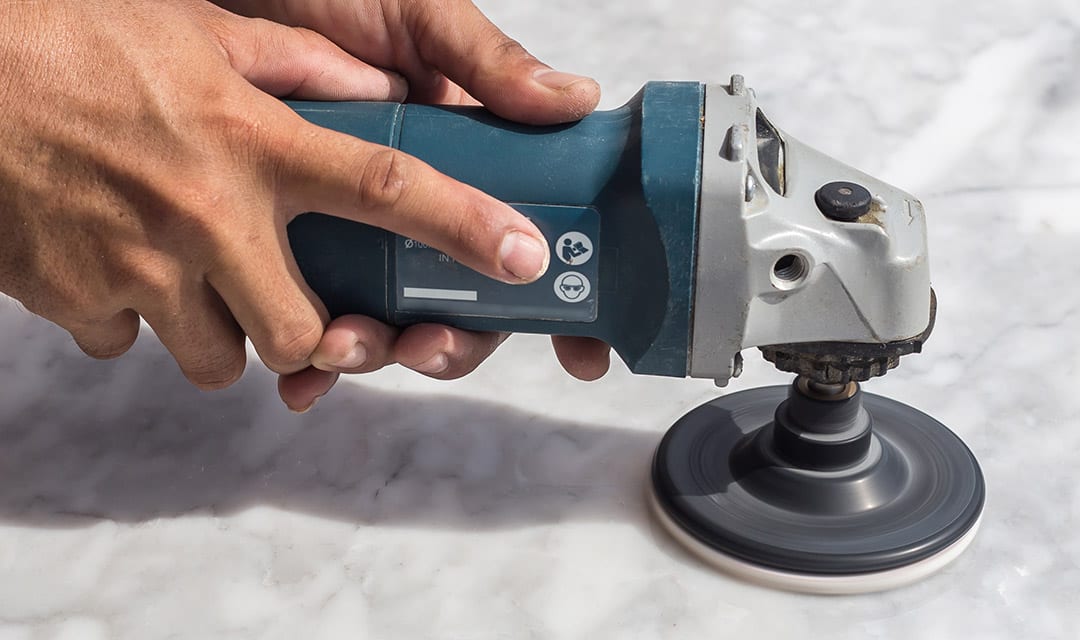
Re-Polishing and Re-Sealing Granite Countertops
The polishing I’m discussing here gives your granite (or other stone countertop) an entirely new surface. It removes a small layer of granite; the layer that is dull, scratched and/or stained; to reveal fresh, smooth, gleaming stone beneath.
How often you re-polish your granite is completely a matter of its appearance. Most granite surfaces require remedial polishing every five to 15 years, depending on the traffic or use they receive.
Your newly polished granite must, of course, then be re-sealed to protect it from stains and other harmful issues. Doctor Granite discusses that process below.
Granite Polishing Options and Techniques
Granite can be polished with dry powder or wet polishing paste. There’s no clear choice here … professionals are divided on the issue of which is better. Both techniques are effective. Consider these pros and cons of wet granite polishing versus dry granite polishing:
- Dry granite polishing powder costs less than paste.
- Powder granite polish can be used dry or wet, so it is more versatile.
- Wet polishing creates a lot of spray when used with power tools, so wearing water-resistant clothing will protect you, and plastic sheeting should be used to protect walls, furniture and cabinets.
- Wet polishing cools the pads which prevents them from becoming excessively hot and wearing out faster than they should.
- Wet polishing pads are less expensive than dry pads.
Based on the type and color of stone you have installed, Doctor Granite can usually suggest which type is most suitable for you; ask me!
Granite Polishing Powder: (also called stone polishing compound) offers a quick and easy way to put a fresh gleam on granite while removing minor scratches and stains. If using it dry, choose a buff polishing pad to work the polish over the surface of the granite in a steady, circular pattern. If using granite polishing powder wet, the best tool is a muslin wheel.
Going Granite relies on Dia-Glo Stone Polishing Compound for use both on new granite in our workshop and factory (located at 812 S. Tejon Street in Colorado Springs, CO) and on older flooring and countertops in our clients’ homes and businesses. Dia-Glo is made in two separate formulas, Dia-Glo Stone Polishing Compound for Dark Granite and Polishing Compound for Light Granite plus an additional variation for use on marble.
When choosing which granite polishing compound to use, consider the primary color of the stone. If it is lighter than medium brown or has predominantly light highlights, then use the Dia-Glo Light. Granite with darker tones is best served by the Dia-Glo polishing powder for Dark Stone.
This stone polishing compound can be used dry or wet with the tools I mentioned. The compound does the work, so excessive pressure should not be used during the process. If you read the directions carefully and follow them closely, you should experience remarkable results.
Another excellent compound is Tenax Granite Polishing Powder. Tenax is a leader in the stone-care industry and this polish is highly rated by users. We also use this compound in our workshop and factory and on job sites to produce a fresh glow on granite flooring, countertops and, in particular, wall panels.
Tenax granite polishing powder is mixed with water. Clear directions are found on the container so getting the mix right is very easy. Surfaces are buffed with felt pads while the polish restores the gleam. This is a top choice both for maintenance and tough restoration projects.
Granite Polishing Cream: Most granite cream polish is designed specifically for countertops. It contains the type of light abrasives best suited to the rich stone Going Granite uses to manufacture fabricate premium finished granite.
One of the top products in this category is MB-20 Stone Granite Polishing Cream. It is ideal for putting a bright factory shine on new countertops or restoring the gleam to countertops that have been in place for a number of years.
We also use this product at Going Granite. This stone polishing cream is particularly suitable for use on engineered stone, such as quartz, as well on natural granite and marble. MB-20’s proprietary blend of abrasives will improve the appearance of the surface immediately. This granite polishing cream is an excellent choice for the entire spectrum of granite hues from light to nearly black. We use MB-20 cream on a hog’s hair pad or similar material for buffing.
Is Re-Polishing Your Granite Countertops a Do-It-Yourself Job?
Many homeowners, property owners and maintenance professionals do their own granite, marble, quartz, slate and other natural stone surface polishing without calling in stone pros!
One of the reasons this is possible is the quality of the premium granite polishing products available. The right polishing powder or cream used according to the labeling produces a restored granite surface that looks like a skilled professional did the work.
Because the majority of the expense is in the labor to do the job rather than in the polishing material, there is significant savings in doing the work yourself!
If the above sounds like a bit more “heavy lifting” than you’d rather tackle personally, give Going Granite a call at 719.439.7077 (or use the form below) for a free, no obligation quote on refinishing your natural stone countertops, floors, wall panels and more.

Re-Sealing Granite
Once you’ve re-polished on your granite surfaces, they need to be re-sealed. This will maintain the sheen while protecting porous stone from stains.
Going Granite recommends a penetrating sealer because they offer the best protection for granite and most other stone surfaces. One of the top-rated sealers of this type is Protex Impregnating Stone Sealer from Tenax. It is suitable for granite, marble and most other stone surfaces as well. Tenax Protex sealer offers outstanding protection against oil, juice, wine, water and other potential stain producers.
A sister product, Tenax Proseal is intended to be a premium professional sealer but, interestingly, is usually more affordable than Protex. Proseal is a good choice for stone countertops that are not subject to food preparation chopping and slicing or dirty, greasy dishes. Before applying this sealer, clean the countertops and give them plenty of time to dry to ensure the best adhesion.
Two Tenax Ager products are excellent on granite that has a dull appearance or when you want to bring out the rich, varied highlights in stone. Tenax Ager Color Enhancing Stone Sealer is a more affordable option, and it is formulated for most natural stone products. It seals the stone while brightening the interesting color variation hues found in it. This product offers both a reliable seal and protection against stains.
Ager Tiger Color Enhancing Stone Sealer is a resin-based product that does wonders for the color of granite, marble and slate. Two coats of this sealer are applied; one before and one after polishing. The outcome is a still-wet look that glistens while enriching the colors in natural stone and resin-enhanced stone products like quartz.
A closing thought from Doctor Granite … re-polish and re-seal your granite countertops periodically and they’ll provide you with durable beauty for decades to come! Call Going Granite at 719.439.7077 if you’d like advise or a free, no obligation cost quote for any of you natural stone remediation projects!
Ask a question or request your free estimate!
Call (719)439-7077
or
complete the form below.
Serving Denver, Colorado Springs and surrounding communities!
Search The Site
Translate This Page
 |
Need landscaping? Visit our Landscape FX sister company's website by clicking here! |


